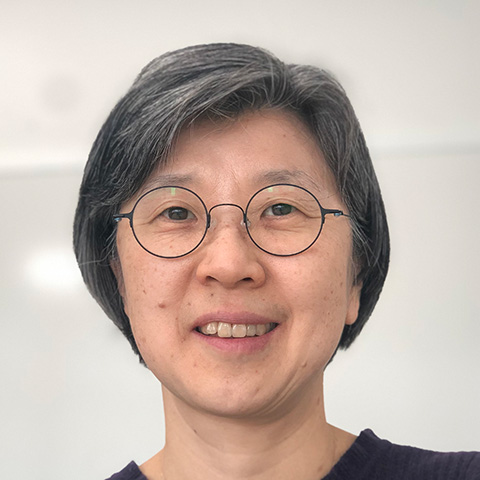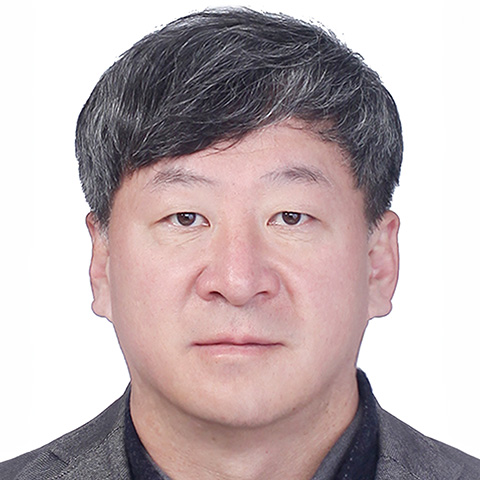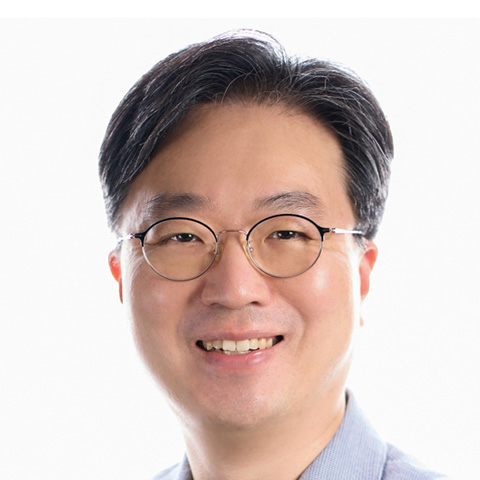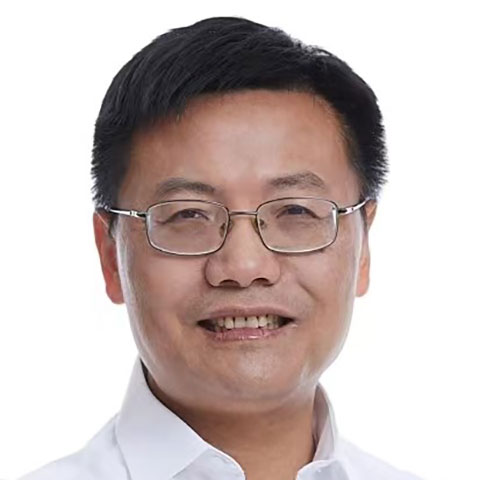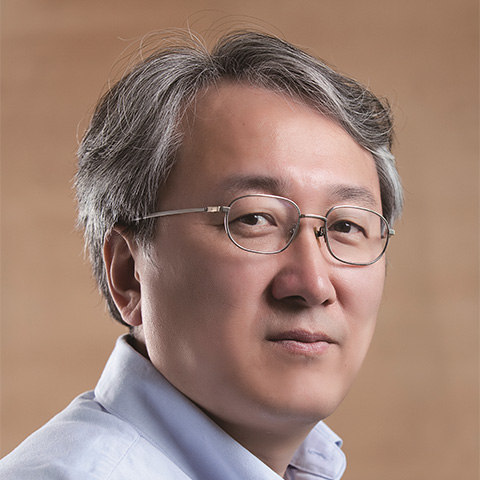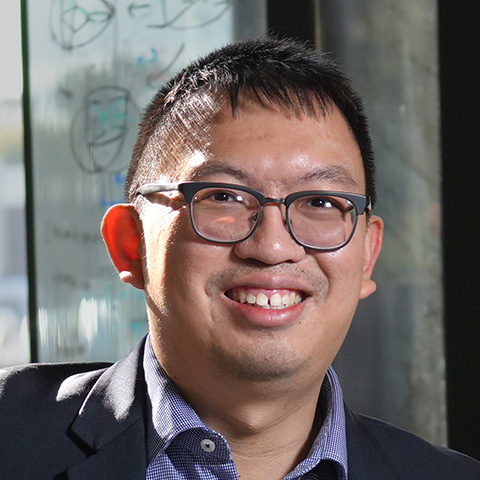Session Information
Cluster 3
AI for Scientific and Social Challenges
Co-Chairs
Eunok Paek, Taehwan Kim, Jinsul Kim
Description
Discover how AI is transforming the way scientists solve problems and tackling important societal concerns. AI's significance is highlighted by experts in the fields of space observation, structural elucidation of proteins and energy and utility solutions. Learn about techniques, ethics, and new trends. Ideal for stimulating innovation at the nexus of AI and societal concerns among researchers, practitioners, and policymakers.
#Scientific Problem-Solving
#Space Observation
#Protein Structure Elucidation
#Energy Solutions
Program
| Day 1 (November 2) | ||
|---|---|---|
| 10:00~11:05 | Chair: Eunok Paek | |
| AI Costs Energy - Does Energy Need AI? | Marc Peters (IBM) |
|
| NeuroTalk: Neural Representation Learning for Intention Decoding and Speech | Seong-Whan Lee (Korea U.) |
|
| 15:30~17:00 | Chair: Taehwan Kim | |
| Recent Progress on AI for Protein Study | Jinbo Xu (MoleculeMind) |
|
| Deepfold: AI for Protein Structure Prediction | Eunok Paek (Hanyang U.) |
|
| AI and Energy: Solutions for a Sustainable Energy | Jinsul Kim (Chonnam Nat'l U.) |
|
| Day 2 (November 3) | ||
|---|---|---|
| 10:00~11:05 | Chair: Jinsul Kim | |
| From Stars to Syntax: Leveraging Deep Learning and Large Language Models for Astronomical Insights | Yuan-Sen Ting (Australian Nat'l U.) |
|
| Space Observation Intelligence | Jae-Young Sim (UNIST) |
|
| Day 1 (November 2) | |
|---|---|
| 10:00~11:05 | |
| Chair: Eunok Paek | |
| AI Costs Energy - Does Energy Need AI? | Marc Peters (IBM) |
| NeuroTalk: Neural Representation Learning for Intention Decoding and Speech Synthesis | Seong-Whan Lee (Korea U.) |
| 15:30~17:00 | |
| Chair: Taehwan Kim | |
| Recent Progress on AI for Protein Study | Jinbo Xu (MoleculeMind) |
| Deepfold: AI for Protein Structure Prediction | Eunok Paek (Hanyang U.) |
| AI and Energy: Solutions for a Sustainable Energy | Jinsul Kim (Chonnam Nat'l U.) |
| Day 2 (November 3) | |
|---|---|
| 10:00~11:05 | |
| Chair: Jinsul Kim | |
| From Stars to Syntax: Leveraging Deep Learning and Large Language Models for Astronomical Insights | Yuan-sen Ting (Australian Nat'l U.) |
| Space Observation Intelligence | Jae-Young Sim (UNIST) |
Talk Title
Deepfold: AI for Protein Structure Prediction
Abstract
DeepFold, a refinement of AlphaFold2, leverages advanced deep neural networks to enhance protein structure prediction. Modifications include novel loss functions, improved alignment methods, and re-optimization techniques. Trained on 31,911 diverse protein structures, DeepFold outperforms AlphaFold2 by 3% in side-chain accuracy on CASP13/14 datasets. In CASP15, it secured the fourth position among 132 groups, displaying significant enhancements in structural details. We are currently working on data distillation of the uniclust30 to expand our protein structure database further. We also intend to develop the end-to-end artificial intelligence methods for template search and alignment.
Short bio
Dr. Eunok Paek is a Professor of Computer Science Department at Hanyang University and the Director of Hanyang Institute for Artificial Intelligence Research. She is an esteemed member of the Korean National Academy of Engineering. With a Ph.D. in Computer Science from Stanford University, her expertise lies in Proteomics and AI. Her research centers on modeling cellular signaling pathways, developing core algorithms for identifying protein sequences and post-translational modifications and quantifying protein expression levels, particularly from mass spectrometry-based proteomics. Her current research involves Integration of proteomics and genomics to identify novel proteoforms for a deeper understanding of diseases, early diagnosis, and personalized medicine and merging AI-based structural proteomics with mass spectrometry to enhance protein 3D structure prediction accuracy.
Talk Title
AI costs energy - Does Energy Need AI?
Abstract
Energy fuels our economy and heats our homes. While the world is hungry about AI and that in consequence increases demand for energy there is a need to find the right balance.
This presentation is not only putting the value of AI in context of the energy and utilities industry. It also elaborates a framework to put this in context of a systemic approach around trustworthiness and sustainability called responsible computing. The session will finish by giving a glimpse into an emerging discussion around an AI usage efficiency factor. The session will be enriched with examples to showcase the main messages.
Short bio
Marc Peters is an IBM Distinguished Engineer with more than 29 years of experience in technology, architecture and consulting. His industry focus is in energy, environment and telecommunications, as well as cross-industry domains. His technology focus is on hybrid cloud, data and AI. As a thought leader he works at the intersection of technology, business, industry and society. He is a board member of bitkom WG Smart Grids and a member of theFraunhofer IEEboard of trusteesuntil mid-2023. Marc is also a member of the IBM Industry Academy, the IBM Academy of Technology and the AoT Technical Council (now Open Innovation Community).
In the latter context Marc has been leading a global initiative called responsible.computing()since early 2020, working with a large team of IBMers and external partnersto address sustainability and trustworthiness in a systemic approach.
Marc holds a Master’s degree in Computer Science and Economics from University of Namur / Belgium. He is a frequent speaker and published author most recently in an HBR (Harward Business Review) paper.
Talk Title
AI and Energy: Solutions for a Sustainable Energy
Abstract
Energy plays a crucial role in our lives, from electricity to technology and industry. However, to fully harness the benefit of AI in the energy industry, there are unique challenges we must overcome. The AI application requires large-scale data to derive meaning and train models, but the data often contains sensitive information, such as personal data. Moreover, data collection processes, often reliant on facility-based sources, may introduce data reliability issues, such as errors and noise. Our research endeavors focus on overcoming these hurdles and harnessing the power of AI for various critical tasks within the energy sector. Our research encompasses energy demand forecasting, efficient building management, energy-focused natural language processing, and predicting and proactively resolving potential issues. This presentation aims to convey the significance of our research efforts in enhancing the energy industry's efficiency, sustainability, and decision-making processes.
Short bio
Jinsul Kim received a BS degree in Computer Science from the University of Utah, Salt Lake City, Utah, USA, in 1998 and MS (2004) and PhD (2008) degrees in Digital Media Engineering from the Korea Advanced Institute of Science and Technology (KAIST), Daejeon, South Korea. From 2004 to 2009, he worked as a researcher at ETRI and later served as an Associate Professor at Korea Nazarene University from 2009 to 2011. He is currently a Professor at Chonnam National University, Gwangju, Korea. In addition to his academic journey, he was at the University of California San Diego from March 2016 to February 2017 for Professor exchange program. He is the Director of G5-AICT research center and co-director of the AI Innovation Hub Research and Development Project at Chonnam National University's Information and Computer Center. He is also the chairman of the National and Public University Intelligence Organization Council. Beyond academia, Prof. Kim actively contributes to international standardization as a member of Korea's national delegation for ITU-T SG13. His research interests include AI, Energy AI, quality of service/experience, edge cloud computing, metaverse, multimedia, and immersive media networks.
Talk Title
Space Observation Intelligence
Abstract
We study to apply AI to space observation data. Space observation data have many challenges. It is extremely large-scale as space telescopes are collecting massive amount of data every day. Data are hard to be labeled as it needs annotations from human experts. Data are noisy due to observation equipment and environment, and also multi-modal. We propose to apply AI to tackle these challenges and solve the important but unsolved scientific problems. First, we propose to use AI to improve the satellite image super-resolution. Second, we study time series data for anomaly detection and prediction of physical quantities such as blackhole mass. Additionally, we also work on classification and detection of galaxies from image observations, which is a longstanding problem in astronomy. Finally, we propose to generate and improve data of deep galaxies to understand the universe.
Short bio
Jae-Young Sim received the B.S. degree in electrical engineering and the M.S. and Ph.D. degrees in electrical engineering and computer science from Seoul National University, Seoul, South Korea, in 1999, 2001, and 2005, respectively. From 2005 to 2009, he was a Research Staff Member with the Samsung Advanced Institute of Technology, Samsung Electronics Company. In 2009, he joined the School of Electrical and Computer Engineering, Ulsan National Institute of Science and Technology (UNIST), Ulsan, South Korea, where he is now a Professor in Graduate School of Artificial Intelligence (AI) and Department of Electrical Engineering. He is also serving as Dean of the College of Information and Biotechnology, Head of the Graduate School of AI, and Director of AI Innovation Park, UNIST. His research interests include image processing, computer vision, and machine learning.
Talk Title
Recent Progress on AI for Protein Study
Abstract
Proteins are one of the three important macromolecules in cells. The elucidation of protein structure and function plays an important role in understanding life processes, developing therapeutics and biomanufacturing. Since 2016 artificial intelligence (AI) has revolutionized protein structure prediction, i.e., predicting the tertiary structure of a protein from its amino acid sequence, which is one of the most challenging problems in computational biology. Afterwards AI has been widely employed by many researchers to study proteins from various perspectives. In this talk I will present the work done by my group on AI for protein study, including AI algorithms on inverse protein folding, protein docking, protein optimization and de novo protein design, as well as their applications to drug design and synthetic biology.
Short bio
Prof. Jinbo Xu, known as "The Founder of AI Protein Folding", is a global pioneer in the field of AI protein study. In 2016, he developed the first AI method RaptorX-Contact demonstrating that AI may significantly improve protein structure prediction, which inspired DeepMind’s AlphaFold software and started the era of AI protein study. His software RAPTOR/RaptorX has been widely used in academia and industry and licensed to MNCs such as Merck and Genentech for protein structure and function study.
Prof. Xu has received quite a few international awards such as ISCB (International Society of Computational Biology) Fellow and PLoS Computational Biology Research Prize in the category Breakthrough/Innovation. As the only representative of mainland China, Prof. Xu has also been invited to attend the 2022 Nobel Symposium on human 3D proteome.
Talk Title
NeuroTalk: Neural Representation Learning for Intention Decoding and Speech Synthesis
Abstract
NeuroTalk technology represents a fusion of interdisciplinary applications encompassing fields of artificial intelligence, brain-computer interfaces, and speech synthesis. Neural representation learning based intention decoding and speech synthesis directly connects the neural activity to the means of human linguistic communication, which may greatly enhance the naturalness of communication. With the current discoveries on representation learning and the development of the speech synthesis technologies, direct translation of brain signals into speech has shown great promise. This talk introduces the current NeuroTalk technology with the possibility of speech synthesis from brain signals, which may ultimately facilitate innovation in non-verbal communication.
Short bio
Dr. Seong-Whan Lee is a Distinguished University Professor at Korea University, where he is the head of the Department of Artificial Intelligence and the director of the Korea University Institute for AI. He served as the founding president of the Korean Artificial Intelligence Association and as the President of the Korean Society for Cognitive Science and the Korea Society for Brain Engineering. He received the B.S. degree in computer science and statistics from Seoul National University, Seoul, Korea, in 1984, and the M.S. and Ph.D. degrees in computer science from Korea Advanced Institute of Science and Technology in 1986 and 1989, respectively.
In March 1995, he joined the faculty of the Department of Computer Science and Engineering at Korea University, Seoul, Korea, and now he is the tenured full professor. A Fellow of the IAPR (1998), IEEE (2010), and Korean Academy of Science and Technology (2009), he has served several professional societies as chairman or governing board member. His research interests include pattern recognition, artificial intelligence, and brain engineering.
Talk Title
From Stars to Syntax: Leveraging Deep Learning and Large Language Models for Astronomical Insights
Abstract
Astronomy is undergoing a transformative era marked by the influx of intricate high-dimensional data garnered by increasingly sophisticated instruments. While this data-rich landscape has broadened our investigative horizons, it also poses challenges that traditional methods struggle to address. One solution lies in leveraging deep learning techniques, which excel at navigating the curse of dimensionality and thereby provide a more faithful representation of complex phenomena. I will discuss how deep generative models is augmenting the capabilities of astro-statistics and theoretical astrophysics, offering a new lens to understand our cosmos. Time permitting, I will introduce AstroLLaMa, our specialized Large Language Model (LLM) for astronomy. These advanced LLMs have the potential to revolutionize the way we conduct literature searches and track intellectual advancements in astronomy.
Short bio
Yuan-Sen is an Associate Professor in astronomy and computer science at the Australian National University and the Ohio State University. Yuan-Sen's research applies machine learning to advance statistical inferences using large astronomical survey data. A Malaysian native, Yuan-Sen received his PhD in astornomy and astrophysics from Harvard University in 2017. After graduating, Yuan Sen was awarded a unique four-way joint postdoctoral fellowship from Princeton University, Carnegie Institute for Sciences, NASA Hubble and the Institute for Advanced Study at Princeton before reallocating to Australia. Yuan-Sen also serves as the co-chair of the NASA Cosmic Programs Stars Science Interest Group and leads future spectroscopic surveys as the science group leader. He is an author of more than 160 journal articles, many of them on topics at the frontier of astrophysics and machine learning.

